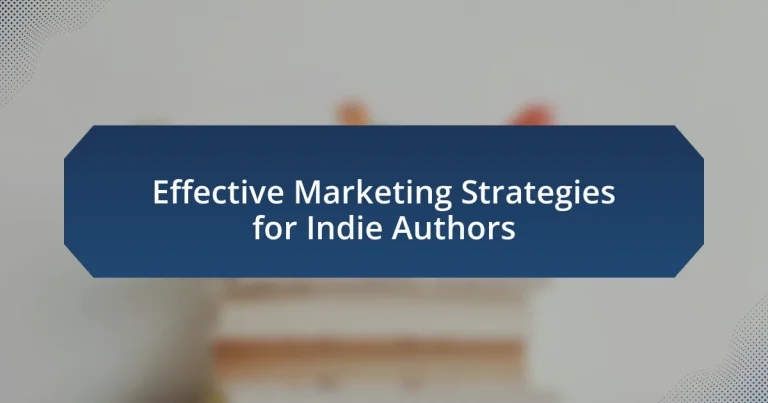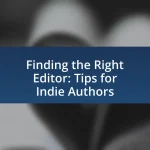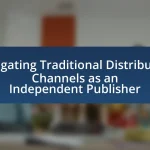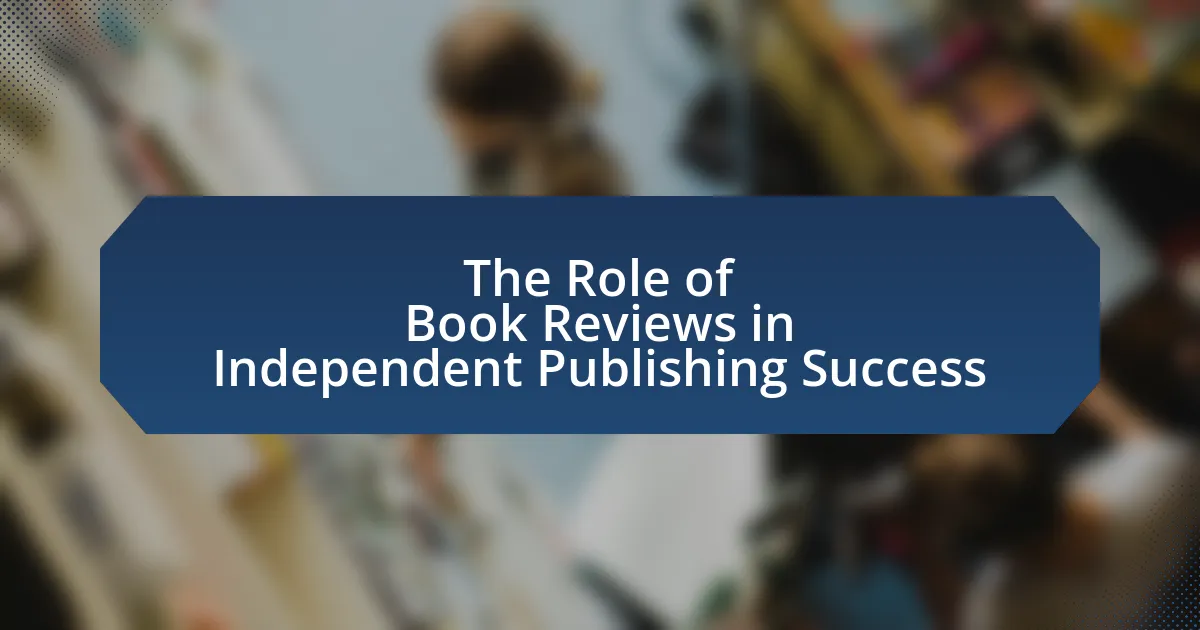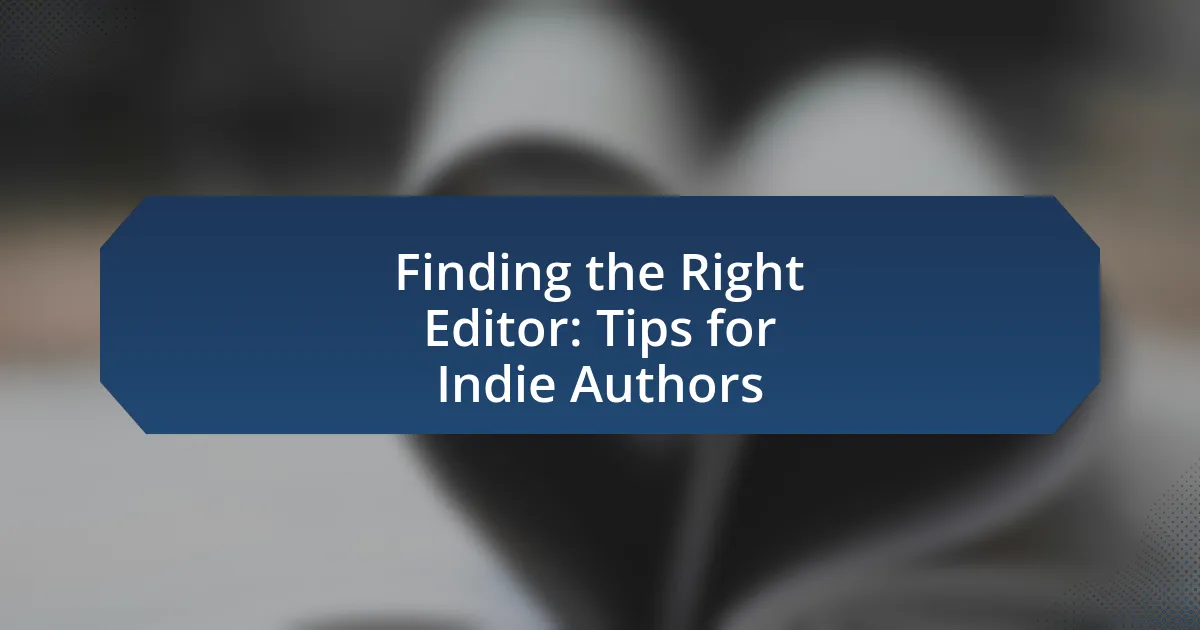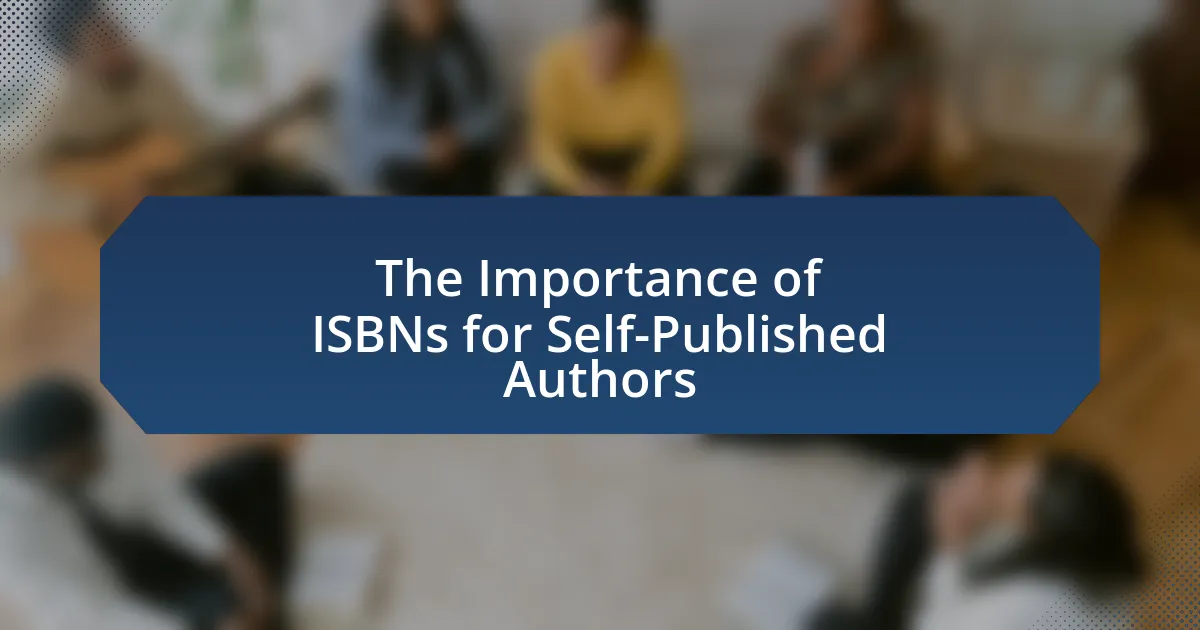The article focuses on effective marketing strategies for indie authors, emphasizing the importance of building a strong online presence, utilizing social media, and engaging with readers through email newsletters. It outlines methods for identifying target audiences through market research and analytics tools, as well as the significance of branding in establishing a unique author identity. Additionally, the article discusses various online marketing channels, content marketing techniques, and best practices for book launches, while highlighting common pitfalls to avoid and practical tips for successful marketing. Overall, it provides a comprehensive guide for indie authors seeking to enhance their visibility and sales in a competitive market.
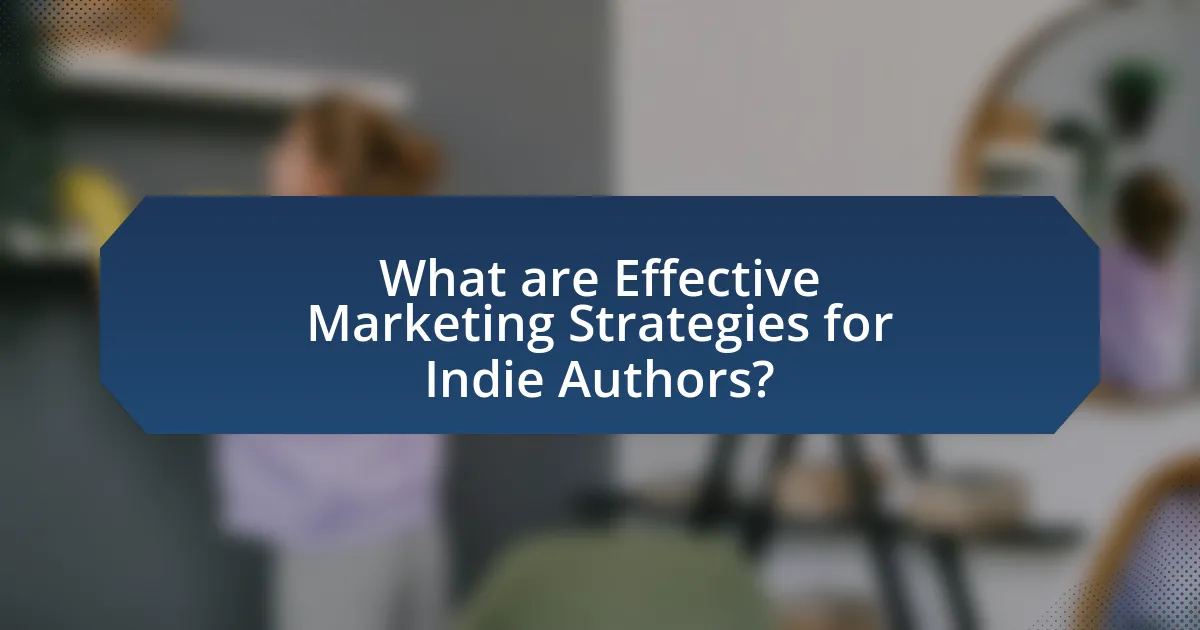
What are Effective Marketing Strategies for Indie Authors?
Effective marketing strategies for indie authors include building a strong online presence, utilizing social media platforms, and engaging with readers through email newsletters. A strong online presence can be established by creating an author website that showcases books, provides a blog, and includes links to social media. Social media platforms like Facebook, Twitter, and Instagram allow authors to connect with potential readers, share updates, and promote their work. Engaging with readers through email newsletters helps maintain a loyal audience and can lead to increased book sales. According to a survey by the Alliance of Independent Authors, 70% of indie authors reported that social media was a key factor in their marketing success, highlighting its effectiveness in reaching target audiences.
How can indie authors identify their target audience?
Indie authors can identify their target audience by conducting thorough market research and analyzing reader demographics. This involves utilizing tools such as surveys, social media analytics, and online reader communities to gather data on preferences, interests, and reading habits. For instance, platforms like Goodreads provide insights into genre popularity and reader reviews, which can help authors understand what resonates with potential readers. Additionally, examining competitors’ audiences and engaging with readers through forums or book clubs can yield valuable information about specific audience segments.
What tools can help indie authors analyze their audience demographics?
Indie authors can utilize tools such as Google Analytics, Facebook Insights, and BookFunnel to analyze their audience demographics. Google Analytics provides detailed insights into website traffic, including age, gender, and geographic location of visitors, which helps authors understand their audience better. Facebook Insights offers demographic data about followers and engagement metrics, allowing authors to tailor their content and marketing strategies effectively. BookFunnel enables authors to gather information about readers who download their books, including email addresses and preferences, facilitating targeted marketing efforts. These tools collectively empower indie authors to make data-driven decisions in their marketing strategies.
Why is understanding the target audience crucial for marketing success?
Understanding the target audience is crucial for marketing success because it enables marketers to tailor their strategies to meet the specific needs and preferences of potential customers. By identifying demographics, interests, and behaviors, marketers can create targeted campaigns that resonate with the audience, leading to higher engagement and conversion rates. Research indicates that personalized marketing can increase sales by up to 20%, demonstrating the effectiveness of audience understanding in driving business results.
What role does branding play in an indie author’s marketing strategy?
Branding plays a crucial role in an indie author’s marketing strategy by establishing a unique identity that resonates with readers. A strong brand helps indie authors differentiate themselves in a crowded market, fostering recognition and loyalty among their audience. For instance, authors like Amanda Hocking have successfully built their brands through consistent messaging and visual elements, which has contributed to their sales and visibility. Effective branding not only enhances an author’s credibility but also creates an emotional connection with readers, making them more likely to engage with future works.
How can indie authors develop a unique author brand?
Indie authors can develop a unique author brand by clearly defining their niche and voice, which helps them stand out in a crowded market. By identifying specific genres, themes, or styles that resonate with their target audience, authors can create a consistent image and message across all platforms. For instance, branding elements such as cover design, author website, and social media presence should reflect this unique identity. Research indicates that authors who maintain a cohesive brand experience see increased reader engagement and loyalty, as evidenced by a study from the Author Earnings report, which highlights that well-branded authors often achieve higher sales and visibility.
What elements contribute to a strong author brand identity?
A strong author brand identity is built on several key elements: authenticity, consistency, audience engagement, and a clear value proposition. Authenticity ensures that the author’s voice and personality resonate with readers, fostering trust and connection. Consistency across all platforms, including social media, website, and published works, reinforces the author’s image and message. Engaging with the audience through interactions, feedback, and community-building activities enhances loyalty and visibility. A clear value proposition articulates what makes the author’s work unique, helping to differentiate them in a crowded market. These elements collectively contribute to a recognizable and impactful author brand identity, essential for effective marketing strategies for indie authors.
What are the most effective online marketing channels for indie authors?
The most effective online marketing channels for indie authors include social media platforms, email marketing, and author websites. Social media platforms like Facebook, Instagram, and Twitter allow authors to engage directly with readers, share updates, and promote their books, with studies showing that 77% of authors use social media for marketing. Email marketing is highly effective, as it provides a direct line to readers, with a reported return on investment of $42 for every dollar spent. Author websites serve as a central hub for information, showcasing books, providing purchase links, and collecting email subscribers, which is crucial for building a loyal readership.
How can social media platforms be leveraged for book promotion?
Social media platforms can be leveraged for book promotion by utilizing targeted advertising, engaging content, and community building. Authors can create tailored ads on platforms like Facebook and Instagram to reach specific demographics, increasing visibility among potential readers. Engaging content, such as behind-the-scenes looks, book trailers, and interactive posts, can capture audience interest and encourage sharing. Additionally, building a community through consistent interaction, such as responding to comments and participating in relevant groups, fosters a loyal reader base. According to a 2021 survey by the Pew Research Center, 69% of adults in the U.S. use social media, highlighting its potential reach for promoting books.
What are the benefits of using email marketing for indie authors?
Email marketing provides indie authors with direct access to their audience, enabling them to build a loyal reader base. This strategy allows authors to communicate regularly with subscribers, share updates about new releases, and promote special offers, which can lead to increased book sales. According to a study by the Direct Marketing Association, email marketing has an average return on investment of $42 for every dollar spent, highlighting its effectiveness in reaching potential readers. Additionally, email marketing allows for personalized communication, which can enhance reader engagement and foster a sense of community around the author’s work.
How can indie authors utilize content marketing to engage readers?
Indie authors can utilize content marketing to engage readers by creating valuable and relevant content that resonates with their target audience. This includes writing blog posts, sharing excerpts from their books, and producing engaging social media content that reflects their writing style and themes. According to a survey by the Author Earnings Report, 70% of readers prefer to connect with authors through their blogs and social media, indicating that consistent and authentic content can significantly enhance reader engagement. By leveraging platforms like Instagram and Twitter, indie authors can build a community around their work, fostering discussions and encouraging reader feedback, which further strengthens their connection with the audience.
What types of content should indie authors create to attract their audience?
Indie authors should create engaging content such as blog posts, social media updates, videos, and newsletters to attract their audience. Blog posts can provide insights into the writing process, character development, or book themes, fostering a connection with readers. Social media updates allow authors to share snippets of their work, interact with followers, and participate in relevant conversations, which can increase visibility. Videos, such as book trailers or author Q&As, can visually engage potential readers and showcase personality. Newsletters can deliver exclusive content, updates on new releases, and personalized messages, helping to build a loyal readership. These content types are effective because they facilitate interaction and provide value, which is essential for audience engagement in the competitive indie publishing landscape.
How can blogging enhance an indie author’s visibility and credibility?
Blogging enhances an indie author’s visibility and credibility by providing a platform to share insights, engage with readers, and showcase expertise in their genre. Regularly publishing quality content increases search engine rankings, making it easier for potential readers to discover the author. According to a study by HubSpot, companies that blog receive 97% more links to their websites, which can translate to higher visibility for indie authors. Additionally, blogging allows authors to build a community around their work, fostering trust and establishing them as knowledgeable figures in their field, which is crucial for credibility.
What are the best practices for book launch marketing?
The best practices for book launch marketing include building an author platform, engaging with readers on social media, utilizing email marketing, and organizing a launch event. Establishing an author platform allows for a dedicated audience, which is crucial for generating interest. Engaging with readers on social media platforms like Instagram and Twitter can create buzz and foster community. Email marketing is effective for directly reaching interested readers, with studies showing that email campaigns can yield a return on investment of $42 for every dollar spent. Organizing a launch event, whether virtual or in-person, can create excitement and provide an opportunity for direct interaction with readers. These strategies collectively enhance visibility and drive sales during the critical launch period.
How can indie authors create buzz before their book release?
Indie authors can create buzz before their book release by leveraging social media platforms, engaging with potential readers, and utilizing email marketing. Social media allows authors to share teasers, cover reveals, and behind-the-scenes content, which can generate excitement and anticipation. Engaging with readers through live Q&A sessions or virtual book tours can foster a community around the book. Email marketing enables authors to build a mailing list and send updates, exclusive content, or pre-order links directly to interested readers. According to a survey by the Alliance of Independent Authors, 70% of successful indie authors use social media to promote their work, highlighting its effectiveness in building pre-release buzz.
What strategies can be employed during the launch week for maximum impact?
To achieve maximum impact during the launch week, indie authors should implement a multi-faceted marketing strategy that includes pre-launch buzz, targeted social media campaigns, and engaging with their audience through live events. Pre-launch buzz can be created by sharing teasers, cover reveals, and countdowns on social media platforms, which can generate excitement and anticipation among potential readers. Targeted social media campaigns should focus on specific demographics that align with the book’s genre, utilizing platforms like Facebook and Instagram to reach the intended audience effectively. Engaging with the audience through live events, such as virtual book readings or Q&A sessions, fosters a personal connection and encourages word-of-mouth promotion. These strategies are supported by the fact that books with strong pre-launch marketing efforts often see higher initial sales, as indicated by a study from the Book Industry Study Group, which found that 70% of successful book launches involved significant pre-release marketing activities.
How can indie authors measure the effectiveness of their marketing strategies?
Indie authors can measure the effectiveness of their marketing strategies by analyzing key performance indicators (KPIs) such as book sales, website traffic, and engagement metrics on social media platforms. For instance, tracking the number of books sold before and after a marketing campaign provides direct evidence of its impact. Additionally, using tools like Google Analytics allows authors to monitor website traffic changes, while social media insights can reveal engagement rates, such as likes, shares, and comments, which indicate audience interest and reach. These metrics collectively offer a comprehensive view of how well marketing efforts are resonating with the target audience.
What metrics should indie authors track to evaluate their marketing success?
Indie authors should track sales figures, conversion rates, website traffic, and reader engagement metrics to evaluate their marketing success. Sales figures provide direct insight into revenue generated from marketing efforts, while conversion rates indicate how effectively marketing strategies turn potential readers into buyers. Website traffic metrics reveal the effectiveness of promotional activities in driving visitors to the author’s site, and reader engagement metrics, such as social media interactions and email open rates, help assess the audience’s interest and connection with the author’s work. Tracking these metrics allows indie authors to make informed decisions about their marketing strategies and optimize their efforts for better results.
How can feedback from readers inform future marketing efforts?
Feedback from readers can significantly inform future marketing efforts by providing insights into audience preferences and engagement levels. Analyzing reader reviews, comments, and survey responses allows authors to identify which themes, genres, or marketing messages resonate most with their audience. For instance, a study by the Pew Research Center found that 70% of readers are influenced by online reviews when making purchasing decisions, indicating that positive feedback can enhance credibility and attract new readers. Additionally, understanding reader demographics and preferences enables authors to tailor their marketing strategies, such as targeted advertising or social media campaigns, to better reach their ideal audience. This data-driven approach ensures that marketing efforts are aligned with reader interests, ultimately leading to increased sales and a stronger author brand.
What common pitfalls should indie authors avoid in their marketing efforts?
Indie authors should avoid several common pitfalls in their marketing efforts, including neglecting their target audience, failing to build an author platform, and underestimating the importance of professional presentation. Neglecting the target audience can lead to ineffective marketing strategies, as authors may promote their work to individuals who are not interested in their genre. A study by the Independent Book Publishers Association found that understanding the target market significantly increases the chances of successful book sales.
Failing to build an author platform, which includes social media presence and an email list, can hinder an indie author’s ability to connect with readers and promote their work effectively. According to a survey by BookBaby, 80% of authors who actively engage with their audience online report higher sales.
Underestimating the importance of professional presentation, such as cover design and editing, can also negatively impact an indie author’s credibility and sales. Research indicates that 75% of consumers judge a book by its cover, highlighting the necessity for high-quality visuals in marketing efforts.
How can indie authors ensure they are not overspending on marketing?
Indie authors can ensure they are not overspending on marketing by setting a clear budget and tracking all marketing expenses meticulously. Establishing a budget allows authors to allocate funds effectively, while tracking expenses helps identify areas where costs can be reduced. According to a survey by the Alliance of Independent Authors, 60% of indie authors reported that careful budgeting and expense tracking significantly improved their marketing ROI. By utilizing free or low-cost marketing channels, such as social media and email newsletters, authors can further minimize expenses while maximizing outreach.
What mistakes do indie authors often make when promoting their books?
Indie authors often make the mistake of neglecting their target audience during book promotion. This oversight can lead to ineffective marketing strategies that fail to resonate with potential readers. For instance, many indie authors focus solely on social media platforms without understanding where their specific audience spends time online, resulting in wasted resources and minimal engagement. Additionally, they frequently underestimate the importance of building an author brand, which can hinder their ability to connect with readers on a personal level. Research indicates that authors who actively engage with their audience through newsletters and community interactions see a 30% increase in reader loyalty. Furthermore, indie authors often overlook the significance of professional cover design and editing, which can diminish the perceived quality of their work and deter potential buyers.
What practical tips can indie authors implement for successful marketing?
Indie authors can implement several practical tips for successful marketing, including building an author platform, utilizing social media, and engaging with readers through newsletters. Establishing an author platform, such as a personal website or blog, allows authors to showcase their work and connect with their audience. Social media platforms like Twitter, Instagram, and Facebook enable authors to promote their books, share updates, and interact with readers, which can increase visibility and engagement. Additionally, sending regular newsletters helps maintain a relationship with readers, providing them with exclusive content, updates on new releases, and promotional offers. According to a survey by the Alliance of Independent Authors, 70% of indie authors who actively engage with their audience through these channels report higher sales and reader loyalty.
